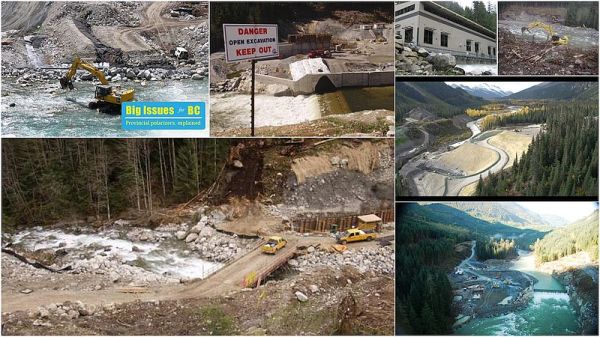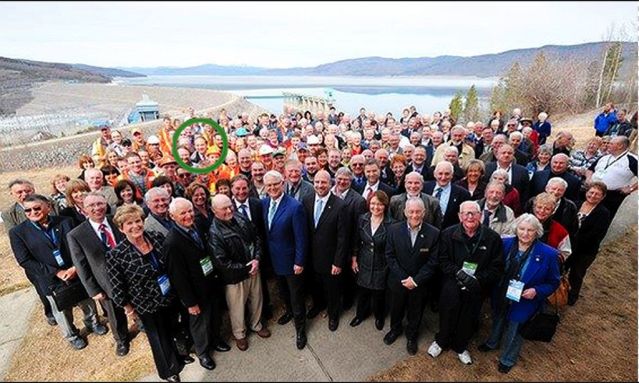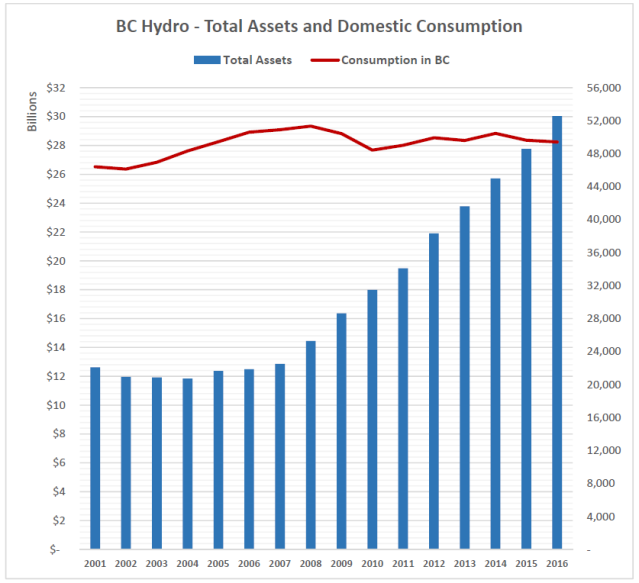Having had a few private requests for the history of BC’s involvement with independent power producers (IPPs), I provide this analysis.
What began more than 10 years ago as a not unreasonable concept for economic activity morphed into a financial disaster for taxpayers and non-industrial consumers of electricity in BC.
Not accidentally, it was a a financial windfall for private power producers and politically connected promoters who did deals with BC Hydro then flipped contracts to utility operators, mostly outside BC. Many a good Liberal stuffed his pockets with cash and the enabling government of the day was incredibly naive or dishonest; probably both.
 Unfortunately, political inertia resulted in a situation grown worse. No party wants to admit it has been following a mistaken path; they believe doing so would shake the confidence of less committed followers. We see the same happening with LNG where everyone but the Clark Government admits opportunity is gone, yet Liberals change the dates and promise rewards are just ahead.
Unfortunately, political inertia resulted in a situation grown worse. No party wants to admit it has been following a mistaken path; they believe doing so would shake the confidence of less committed followers. We see the same happening with LNG where everyone but the Clark Government admits opportunity is gone, yet Liberals change the dates and promise rewards are just ahead.
In three years of the early 2000s, BC Hydro sold power worth more than $11 billion to American customers. Gordon Campbell’s government thought there were good prospects for continuing sales in the USA. They encouraged private companies to plan generating facilities all over BC to create power for export. BC Hydro moved its transmission facilities into a new open access corporation – since reversed – and some believed Government’s energy plan plan was moving BC toward a privatized system.
Liberals publicized the new plan as one involving a “triple bottom line” balancing environmental, financial and social considerations. They believed the public would accept “run of river” projects as environmentally benign. However, proponents would only proceed if financial and marketing risks were limited. The solution was for private companies to build and operate generating facilities but to sell their entire output to BC Hydro, which would collect and resell it.
Politicians assumed that power demand would grow and prices rise so they readily agreed to BC Hydro purchase contracts that were decades long with annual price escalation tied to inflation. They carelessly assumed the arrangements would be beneficial to all. However, what private industry achieved was guaranteed sales with guaranteed profits. All of the financial risks were carried by the public.
Run of river facilities – recently described by BC Green leader Weaver as mere “water wheels” – often turned into “ruin of river” projects. Campbell’s neoliberalism believed that business should self-regulate so there were few constraints to protect the environment. This hands-off attitude was popular in Stephen Harper’s Ottawa and the once powerful federal fisheries ministry now turned a blind eye to ruination of fish bearing streams and rivers.

In the past decade, modern technology has allowed each of us to use less electricity and de-industrialization of North America contributed to softening of demand. In addition, alternative energy supplies have grown, particularly in the western USA. Improved techniques and materials reduced the cost and improved practicality of wind and solar power. The trend will continue.
BC Hydro hoped it would sell large quantities of electricity to domestic mining and energy companies. The main problem is that they want to pay a fraction of what it costs BC Hydro. So, yes, power can be sold but it cannot be sold profitably. In the most recent quarter, BC Hydro sold surplus power at 30% of the price it paid private power producers. (These are average prices published by the provincial utility.)
All of BC’s energy experts understand this situation. But, political inertia still applies. Government won’t admit it is forcing BC Hydro to follow a path to disaster so, rather than doing the right thing, it will hire more spin doctors to spread false information.

A collection of BC Liberals, closet Liberals and hangers-on gather to cheer Gordon Campbell’s devastating energy policies. The individual circled is now Leader of the Green Party and a strong proponent of private power producers.

Categories: BC Hydro, Independent Power Producers (IPP)



A timely and necessary question that must be asked of those planning to run for election as provincial MLAs in May 2017 is, “How do we get out of this IPP mess?”
LikeLike
The first step, Lew, would be a full-stop moratorium on new IPPs — yet the BC Libs continue to permit new ones. It’s lunacy.
LikeLike
Carole James proposed a moratorium during the 2009 election campaign.
http://www.cbc.ca/news/canada/british-columbia/hydro-power-production-electrifies-b-c-election-campaign-1.800238
But as Rafe says below, no one believed that any government could be so evil. We now have the proof (on this and many other files) that a BC Liberal government can indeed be exceedingly evil.
We must encourage and assist the Opposition to rectify its 2013 mistake of not repeatedly putting examples of this evil in the face of every potential voter from now until the next election. It’s an uphill battle given the state of the fourth estate in this province but I cannot believe the vast majority of BC citizens would reward the BC Liberals with their vote if properly informed.
LikeLike
Thanks for the link back to Carole James, Lew. I don’t recall ever hearing that… or perhaps too much water has run through my turbine since then.
The housing/ real estate crisis might be top of mind with many people, currently. It is a regional concern, mainly for Metro, Kelowna and lower Island people — but Hydro mismanagement and IPP contracts should be of concern to anyone who isn’t living off-grid anywhere in the province. Hydro rates will affect us all for years. To me, Hydro is the biggest issue and I bring it up wherever I can.
LikeLike
When trying to explain what this policy really meant, in the 2009 and 2013 elections, no one believed that any government could be so evil. I didn’t until I visited the Ashlu in 2008, something politicians and scientists couldn’t be bothered to do. Many of us went all over the province making speeches telling what would happen environmentally and financially to BC Hydro. Even when the numbers came out and the pictures got printed, the guilty went into the deep denial which accompanies breach of the public’s trusr. Many are still in denial.
This was no mistake, folks, the evidence was clear and the warnings professional and horribly accurate. It’s interesting to note that none who peddlec rhe crap about undisturbed, babbling little streams unharmed in any way by little Mom and Pop operations as they made cheap power for the people, have come out and admitted their crimes against nature in order to reward large corporate friends of the government. That money, much of it going to the Liberal party from grateful corporations, is yout money.
Not one of them has the guts to say they were wrong and apologize for their gross neglect, or worse.
For shame!
LikeLike
I’d like to know the payment rate for a paid-up IPP at Scuzzy (or Skuzzy) Creek, near Boston Bar.
This was one of the earliest IPPs, built during the NDP era, and it was on a 20-year contract that would be due for renegotiation in 2013. Since all the capital cost would presumably be paid off, I’d hope that BC Hydro could — and would — hardball them down to market price for their power.
It would be nice to know…
LikeLike
Rafe…..you missed “professional” journalists….they, above all, “couldn’t be bothered to”. I would also like to re-inforce all of the previous Ministers of Energy and/or Environment that had a hand in forever negatively impacting our future have conveniently “slunk” into the background…..Penner, Lekstrom….and soon Bennett to follow….add to that a litany of politically appointed bureaucrats.
http://www.bclocalnews.com/opinion/129913498.html?mobile=true
http://www.newwestrecord.ca/cmlink/lmp-lower-mainland-papers/coquitlam-now/opinion/cop-talk/letter-burrard-thermal-controversy-not-a-left-or-a-right-thing-1.1792165
http://commonsensecanadian.ca/ipp-champion-tzeporah-berman-returns-to-vancouver-read-her-fluff-piece-in-the-vancouver-observer/
LikeLike
You are right … I’ve bashed at them so much and so often I’m afraid I forgot about them. Can you imagine what Vaughn Palmer & Co would have done if this had been Glen Clark’s or Ujjal Dosanj’s policy? And the money stolen from BCH – and stolen it was – went to NDP pals with a good chunk showing up back in NDP party coffers?
We all have to wake up and I of all people have no right being asleep at the switch. This should be a major scandal! Rivers ruined to make large private, mostly foreign companies richer, the money lifted from our pockets via BCH, BCH being destroyed in the bargain and The Liberal Party of BC handsomely rewarded for OUR generosity! Supported for God’s sake by the leader of the Green Party and tolerated by a silent NDP..
THIS SCANDAL ISN’T EVEN THE SLIGHTEST BIT SUBTLE, FOLKS!
LikeLike
Rafe, you forgot our “professional” journalists. They….above all….. “couldn’t be bothered”. So many of our previous Ministers and politically appointed bureaucrats that had a big hand in pushing this “ruin of river” agenda have slunk into the background, offering no facts that dispute Norm’s figures. They have forever adversely impacted the future of this province, yet are not held accountable. Penner, Lekstrom….and now Bennett. Oh yeah, a fella named Campbell too.
http://commonsensecanadian.ca/ipp-champion-tzeporah-berman-returns-to-vancouver-read-her-fluff-piece-in-the-vancouver-observer/
or this reply to a column by Mrs. Fletcher’s husband
http://www.bclocalnews.com/opinion/129913498.html?mobile=true
LikeLike
A comment for this article at Reddit:
The BC NDP need to give this BC Liberal mess a nasty, yet catchy, name that will stick so voters remember when voting in 2017.
We still hear about the “fast ferries fiasco” even though it’s ancient history now and pales in comparison to the money wasted by the BC Liberals through corruption and incompetence. Example, the BC Liberals have wasted hundreds of millions, if not more, on IT projects that don’t work. We don’t know how much has been wasted really because the BC media is lame and won’t report it properly.
LikeLike
The deliberate destruction of BC Hydro by Gordon Campbell magnificently assisted by the mindboggling, world class incompetence of Christy Clark is a hall of fame screw-up which reminds me of the UK Labour government’s 1947 East African groundnut scheme described here in HISTORY TODAY
“The East African groundnuts scheme was postwar Britain’s equivalent of the Millennium Dome. In pursuit of a laudable objective, millions of pounds of taxpayers’ money was poured diligently into a sump of official incompetence. Started in 1947 by the Labour government, to grow peanuts in Tanganyika (now Tanzania) as a contribution to both the African and the British economies and to alleviate a world shortage of fats, the scheme was ill planned, failed to allow for the area’s soil and rainfall, and employed unsuitable agricultural methods, including the wrong kind of machinery for the terrain. Nor had local traditions and attitudes been taken into account. The scheme’s most successful crop was a bountiful harvest of official gobbledegook.”
The only difference, but a critical one for voters, is that the Labour government’s groundnuts scheme was just government incompetence on a huge scale while the murder of BC Hydro was that too, but also deliberate Fraser Institute hatred of Crown Corporations etched into basic Gordon Campbell political philosophy put into instant practice on his election.
LikeLike